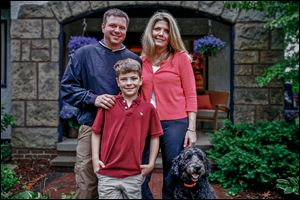
DIPLOMATIC TENSIONS
Russian ban on adoptions puts families’ plans in limbo
Area couples hope Obama addresses issue at summit
6/17/2013
Jamison and Jennifer Diehl, with their son John, 11, and dog Trigger, were adopting a Russian boy, 6. Their plans went on hold in December when Russia banned adoptions by U.S. citizens.
The bond that was formed between the Pinkelman family of Toledo and a 6-year old Russian child, Eduard, was one of complete surprise.
When Daniel and Kendra Pinkelman decided to be host parents last year for a child from Russia, they did not know what impact the experience would have on their lives. With two biological children — an 11-year-old daughter and an 8-year-old son — the couple did not initially plan to adopt a child.
Mrs. Pinkelman said the family watched their church pastor’s family host a child through a Sylvania organization called Friends of Russian Orphans and thought it would be something they could do too.
“We thought it would be a great experience for them,” she said of her own children. “We didn’t enter it really looking at adoption.”
But her thoughts changed when she met Eduard through Journeys of Joy. Friends of Russian Orphans runs the summer program, which brings orphans to the United States for the summer and matches them with host families.
“It was like he had always been here. We just fell in love with him immediately. Our children bonded very quickly with him. It kinda took us all by surprise, I think,” Mrs. Pinkelman said.
Mrs. Pinkelman described Eduard as an active child, who liked to swim, help cook, and play with the family’s cat.
“He just really made a home here,” she said. “We decided that we wanted to adopt Eduard. We felt like we could give him a loving home, so we started the process right away.”
In July, 2012, the Pinkelman family filled out paperwork for the potential adoption and then they were invited to visit Russia to complete more of the process.
It was then that Mr. and Mrs. Pinkelman told Eduard they wanted to adopt him and would return for him.
So far, that has not happened because of a law signed by Russian President Vladimir Putin in December that prohibits American citizens from adopting Russian children. Russian lawmakers enacted the ban in response to an American law that would punish Russian citizens for human rights offenses.
The ban shocked many families, including seven in Ohio that had nearly completed the adoption process. The families soon found themselves unable to reach the children they were planning to take home.
“Shortly after the decree came down, there was a lot of confusion,” Mr. Pinkelman said. “All of a sudden communication dropped.”
He said the family sent letters to the orphanage where Eduard lived, and the last time they heard anything about him was Jan. 18.
“We continued to send a couple after that,” he said, adding that his family was later sent a letter that told them they were no longer allowed to send anything to the orphanage.
Mr. Pinkelman said he doesn’t want to let Eduard down and knows that other families who are caught up in the process probably feel the same way.
“We met these kids. We made these promises,” he said.
Jamison and Jennifer Diehl of Ottawa Hills are in a similar situation. Mrs. Diehl said she had struggled with infertility and wanted to adopt.
When they met Daniil, who is now 6 years old, through the same summer program, they were captivated.
“My husband said this child will be part of the family,” Mrs. Diehl recalled.
When the Diehls traveled to Russia to work through the same process, they brought their 11-year-old son, John, set on giving him a taste of a new culture.
Both families say they won’t give up on their hopes for adoption.
They joined many other American families who sent 8,000 letters supporting U.S.-Russian adoptions to Washington in May, in hopes of convincing President Obama to negotiate the ban with Mr. Putin at the G8 Summit today.
Other leaders, from Japan, Italy, Germany, the United Kingdom, France, and Canada also will attend the summit, which allows leaders to meet and discuss major issues in an informal setting.
The families’ lack of contact with the children they plan to adopt presents even more worries.
“The hard part is, we don't know what they know,” Mrs. Diehl said.
Mrs. Pinkelman said the support and solidarity of the outpouring of letters helped her stay motivated for the cause. Advocacy has been a primary endeavor for both families, who have met with many lawmakers, including U.S. Rep. Marcy Kaptur (D., Toledo), U.S. Rep. Bob Latta (R., Bowling Green), and Sen. Rob Portman (R., Ohio) to try to work out the issue.
But at the end of the day, both families seem to be worried the most about letting down the children they desperately wanted to welcome into their homes.
“These children call us mom and dad,” Mrs. Diehl said, adding that she hopes a “bridge” can be built between the United States and Russia, further increasing positive relations on the issue.
“We need a positive foundation,” she said.
Contact Kelly McLendon at: kmclendon@theblade.com, 419-724-6522 or on Twitter @KMcBlade.